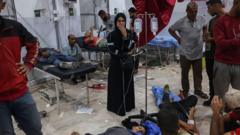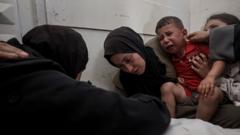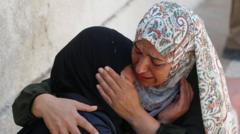Recent reports indicate that over 400 Palestinians have been killed in Gaza since May, with many fatalities linked to escalating violence during food aid distribution. The UN has sharply criticized the distribution system, describing it as a humanitarian abomination that militarizes food access.
UN Decries Humanitarian Crisis in Gaza as Aid Distribution Leads to Deadly Incidents

UN Decries Humanitarian Crisis in Gaza as Aid Distribution Leads to Deadly Incidents
Alarming casualties have surged in Gaza with the United Nations condemning the current food distribution mechanisms backed by the US and Israel, calling it a "death trap."
In a tragic escalation of violence in Gaza, at least 46 individuals seeking aid have lost their lives due to Israeli gunfire across two separate incidents in central and southern regions, as reported by hospital officials and rescue teams. This alarming trend has prompted the United Nations to sharply criticize the current food distribution mechanism, which is supported by the US and Israel, labeling it a "death trap" and an “abomination.”
The steady increase in casualties has gone largely unnoticed internationally, particularly following Israel’s recent military actions against Iran. According to the UN, since the Gaza Humanitarian Foundation's (GHF) operations began in late May, over 410 Palestinian fatalities have been attributed to Israeli attacks. “Why are our children's lives seen as so cheap?” questioned Umm Raed al-Nuaizi, a widow whose son suffered severe injuries while collecting food for his family.
Footage from the al-Awda hospital in Nuseirat showed chaotic conditions, with numerous young men carrying gunshot wounds and some succumbing to their injuries. In one incident, at least 21 individuals died, with approximately 150 more injured when Israeli soldiers reportedly opened fire on a crowd near a GHF site. The Israel Defense Forces (IDF) stated the gathering posed a risk, while the GHF denied any ongoing incidents at the site.
The distressing narrative continued as rescuers reported another incident in southern Gaza, where 25 people were killed, and graphic testimonies emerged from witnesses who described lethal fire directed at civilians during food distribution efforts. Amid these crises, the IDF asserted that it remains committed to the independence of the GHF’s operations in aid distribution.
Israel recently altered its blockade on Gaza to allow aid supplies, amid concerns about the chronic food shortage affecting civilians. While GHF claims success in distributing millions of meals, major humanitarian organizations have distanced themselves from the entity, arguing it collaborates with Israeli objectives to combat Hamas, breaching fundamental humanitarian practices.
In Geneva, Thameen al-Kheetan from the UN human rights office condemned the militarization of humanitarian aid, which he argued contravenes international aid distribution standards. Philippe Lazzarini, the head of the UN agency for Palestinian refugees, echoed these sentiments, articulating that the situation is one that “humiliates and degrades” desperate populations.
Despite the ongoing crises, Israel maintains its stance on facilitating aid distribution while warnings persist that the dire food situation in Gaza is prompting widespread despair. For many families like that of Mahmoud al-Ghura, the risks of seeking aid sites have become too perilous, dubbing them "death zones."























